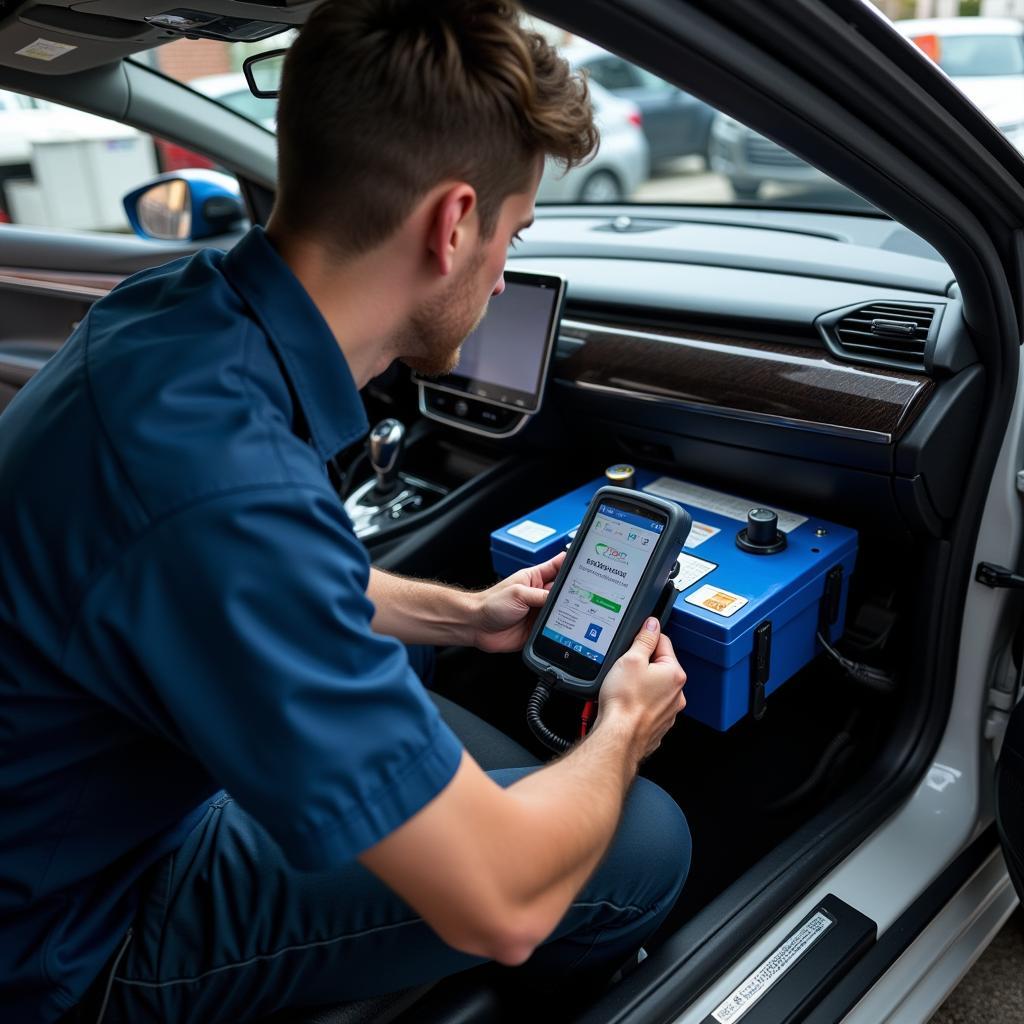What is Tune Up Car Service?
A tune-up car service is essentially a health check for your vehicle, designed to optimize its performance, improve fuel efficiency, and prevent potential problems. But what does a tune-up entail in today’s modern cars? Let’s delve into the details. You can learn more about general car services at what do car services do.
Understanding the Modern Tune-Up
Unlike older vehicles with carburetors and distributors, modern cars rely on sophisticated computer systems and electronic components. Therefore, a “tune-up” has evolved beyond simply adjusting mechanical parts. Today’s tune-up focuses on inspecting, testing, and replacing components related to the engine’s performance and emissions control systems. This involves checking spark plugs, filters, fluids, and sensors, as well as diagnosing any electronic issues using specialized diagnostic tools.
Knowing when your car needs a tune-up can save you money and hassle in the long run. Common signs include decreased fuel economy, rough idling, difficulty starting, and reduced engine power. However, regular maintenance as recommended by your car’s manufacturer is the best way to avoid these issues altogether. For more insight into the importance of car service, see why getting car service isimportant.
Key Components of a Tune Up Car Service
A thorough tune-up typically involves the following checks and services:
- Spark Plugs: These ignite the air-fuel mixture in the engine cylinders. Worn-out spark plugs can lead to misfires, reduced power, and poor fuel economy.
- Air Filter: This filter prevents dust and debris from entering the engine. A clogged air filter restricts airflow, leading to reduced performance and fuel efficiency.
- Fuel Filter: This filter removes contaminants from the fuel before it reaches the engine. A dirty fuel filter can cause fuel delivery problems and engine damage.
- PCV Valve: The Positive Crankcase Ventilation valve helps remove harmful gases from the crankcase. A faulty PCV valve can cause oil leaks and engine sludge buildup.
- Sensors: Various sensors monitor engine performance and emissions. Faulty sensors can lead to a range of problems, including poor fuel economy, increased emissions, and drivability issues.
- Fluid Checks: This includes checking and topping off essential fluids like engine oil, coolant, brake fluid, power steering fluid, and transmission fluid.
- Diagnostic Scan: This involves using a specialized computer to scan for any error codes stored in the car’s computer system. These codes can pinpoint potential problems and guide further diagnostic procedures.
What are the benefits of a car tune-up?
Regular tune-ups offer several benefits, including improved fuel economy, enhanced performance, reduced emissions, increased engine lifespan, and improved safety. These benefits contribute to a smoother, more reliable driving experience and can save you money on repairs in the long run.
How often should I get a tune-up?
The frequency of tune-ups depends on your car’s make, model, and driving habits. Refer to your owner’s manual for specific recommendations. However, a general guideline is to get a tune-up every 30,000 to 50,000 miles. For information on the duration of a typical car service, refer to how long does it take to get car serviced. You can also learn about the components of a major car service from what is involved in a major car service.
Is a tune up the same as a car service?
While both involve maintaining your vehicle, a tune-up focuses specifically on optimizing engine performance and emissions, whereas a car service can encompass a wider range of maintenance tasks, including brake inspections, tire rotations, and other routine checks.
Conclusion
Understanding what a tune-up car service entails is crucial for maintaining your vehicle’s health and performance. By staying proactive with regular maintenance and addressing any potential issues promptly, you can ensure your car runs smoothly, efficiently, and reliably for years to come. Don’t neglect this vital aspect of car care.
FAQ
- How much does a tune-up cost? The cost varies depending on your car’s make and model and the specific services included.
- Can I perform a tune-up myself? While some basic maintenance tasks can be done at home, a thorough tune-up often requires specialized tools and expertise.
- What are the signs my car needs a tune-up? Common signs include decreased fuel economy, rough idling, difficulty starting, and reduced engine power.
- How long does a tune-up take? It typically takes a few hours to complete.
- What is the difference between a tune-up and an oil change? An oil change is a specific maintenance task, while a tune-up encompasses a broader range of services.
- What should I expect after a tune-up? You should notice improved fuel economy, smoother engine performance, and reduced emissions.
- How can I find a reputable mechanic for a tune-up? Check online reviews and ask for recommendations from friends and family.
Common Tune-Up Scenarios
- Scenario 1: Decreased Fuel Economy: A drop in fuel efficiency can indicate a need for a tune-up, especially if accompanied by other symptoms like rough idling or reduced power.
- Scenario 2: Engine Misfires: Misfires can be caused by worn spark plugs or other ignition system issues, often addressed during a tune-up.
- Scenario 3: Check Engine Light: While not always related to a tune-up, a check engine light can signal a problem that needs to be diagnosed, which might be part of a comprehensive tune-up service.
Further Reading and Resources
For more information on car maintenance and related topics, explore the following resources: how to transmit church service to car radio.
Contact Us
For any car service needs or inquiries, don’t hesitate to reach out to us via WhatsApp: +1(641)206-8880, Email: [email protected] or visit our location at 456 Oak Avenue, Miami, FL 33101, USA. Our 24/7 customer service team is always ready to assist you.

